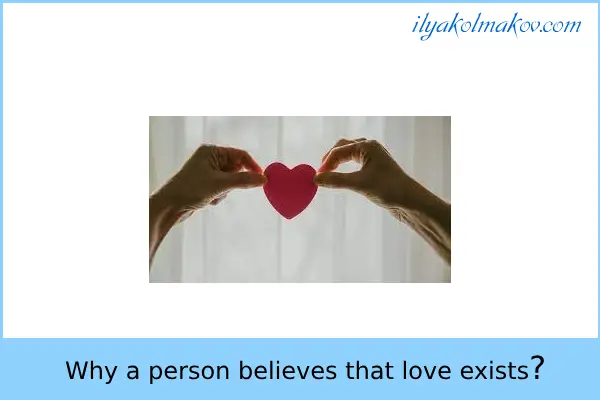
I would like to share my thoughts about why a person believes that love exists.
In fact, a person directly encounters only reality, while love, in his mind, plays the role of an ideal that a person cultivates in himself with the help of the information environment. What happens to a person is not his choice, since he came from his environment, regardless of any of his intentions. It is possible that it is his own lack of understanding of the cause-and-effect relationships between what he cultivates in himself as ideas about the processes around him that is the reason for the creation and maintenance in his head of certain ideals, which to some extent serve for him a kind of consolation.
Therefore, he is forced to create a non-existent ideal in order to somehow fill his lack of understanding of certain processes. Moreover, culture forms in him an idea of \u200b\u200bgood and bad, what should be strived for, and what should not be. And if at every step and from every iron they play songs about love, then sooner or later a person will consider that he needs a “second half”, because, from the point of view of culture, a person himself is inferior, or rather, culture inspires a person with the idea of his inferiority.
That is, as can be seen from this example, the basic "values" in a person's life are artificial, in the sense that they are simply brought into him by the culture in which he was brought up, but not by his personal need. Get married, buy an apartment, give birth to children, etc. - these are all settings of the cultural environment, because this environment is simply forced to function somehow. From the point of view of culture, a person is simply an element of human society and for it there is only the image of an average person, but not the person himself as an independent being.
Of course, I do not mean independence on the material level, simply because a person is conditioned by the material world, as he is a part of it. By independence, I mean freedom from social stereotypes. As such, human existence does not cease to be absolutely conditioned by the environment. But a person can direct his efforts inward - to know himself, instead of being in a state of constant competition for the attributes of an element of the social environment.
Society encourages a person to assert himself in his stereotypes
Society encourages a person to assert himself in his stereotypes, and so-called love is just one of them. A person, if he is constantly and for a long time influenced by any information, begins to perceive it as something obvious - absolutely natural. He doesn't even have the urge to look at things from a different angle. Therefore, all his energy is spent on feeding the social system, but not understanding himself - his real needs, unrelated to his identity within the social organism.
Existence within the midst implies stages that a person is inevitably forced to go through, being in an unconscious age or at an unconscious level of development - regardless of age. The higher the level of development, the less a person needs to refer to social stereotypes in his idea of what is good and what is bad.
Love is a built-in prejudice
Love is a prejudice built into a person that leads him away from seeing the cause-and-effect relationships between the processes taking place around him and his own situation. I say this with such confidence, not because I am trying to oppose something to the concept of love, but because seeing the cause-and-effect relationships between processes eliminates the need for the concept of love as a complete concept.
What does a person feel after a breakup?
It is as if love is assumed by itself, thereby giving rise to its opposite, dislike. And everything that a person associates with dislike is the opposite created by love. Therefore, dislike is a product of love. After all, if love is regarded as something absolute, then why is it always so selective that it generates objects that are unworthy of it. It turns out that love is selective and thus limited.
The very intention of love in relation to an object, as to a loved one, means a certain endowment of this object with qualities that make it possible to identify this object as a loved one. That is, love singles out its object from the multitude of objects to which it does not manifest itself in any way from the position of love.